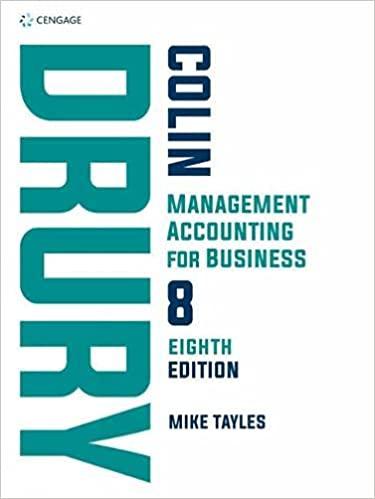Question
Case Study: Capital Accounting Capital accounting is a fundamental aspect of financial management that involves the recording, tracking, and reporting of a company's capital assets,
Case Study: Capital Accounting
Capital accounting is a fundamental aspect of financial management that involves the recording, tracking, and reporting of a company's capital assets, liabilities, and equity. Let's explore a case study of a manufacturing company to understand the concept of capital accounting in practice:
Company Overview: XYZ Manufacturing Company is a leading manufacturer of industrial machinery. The company owns several manufacturing plants, machinery, equipment, and other capital assets necessary for its operations. XYZ Manufacturing follows strict capital accounting practices to manage its assets effectively.
Asset Acquisition: When XYZ Manufacturing purchases new machinery or equipment for its production facilities, it records the acquisition cost as a capital expenditure. This cost includes the purchase price of the asset, transportation and installation costs, and any other expenses directly attributable to bringing the asset into use.
Asset Depreciation: Over time, capital assets like machinery and equipment lose value due to wear and tear, technological obsolescence, or other factors. XYZ Manufacturing applies depreciation methods, such as straight-line or accelerated depreciation, to systematically allocate the cost of assets over their useful lives. Depreciation expense is recorded on the income statement, reducing the carrying value of the assets on the balance sheet.
Capitalization of Costs: In addition to acquisition costs, XYZ Manufacturing may incur certain costs associated with improving or enhancing its capital assets. These costs, known as capital expenditures, are capitalized and added to the carrying value of the asset. For example, if the company invests in upgrading its machinery to improve efficiency, the cost of the upgrade is capitalized and depreciated over the asset's remaining useful life.
Asset Disposal: When a capital asset reaches the end of its useful life or is no longer needed for operations, XYZ Manufacturing may dispose of the asset. The company records the disposal of assets by removing them from the balance sheet and recognizing any gain or loss on disposal in the income statement. The proceeds from the sale of assets are also recorded as a cash inflow.
Financial Reporting: XYZ Manufacturing prepares financial statements, including the balance sheet, income statement, and cash flow statement, to communicate its financial performance and position to stakeholders. Capital assets are reported on the balance sheet at their net book value, which is the original cost of the asset less accumulated depreciation. This provides investors and creditors with information about the company's investment in productive assets and their contribution to generating revenue.
Objective Type Question:
Which of the following best describes the purpose of capital accounting in XYZ Manufacturing Company?
A) Recording sales revenue B) Tracking inventory levels C) Managing capital assets D) Calculating operating expenses
Step by Step Solution
There are 3 Steps involved in it
Step: 1

Get Instant Access to Expert-Tailored Solutions
See step-by-step solutions with expert insights and AI powered tools for academic success
Step: 2

Step: 3

Ace Your Homework with AI
Get the answers you need in no time with our AI-driven, step-by-step assistance
Get Started


